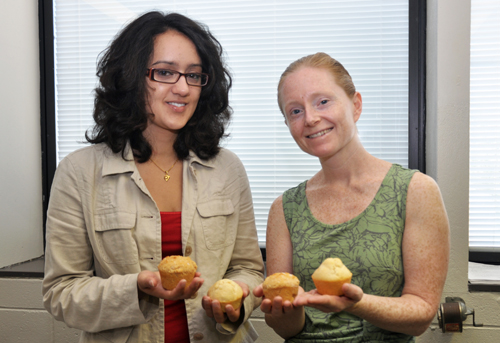
Can a muffin a day keep the doctor away? Make that two soy-based muffins a day for six weeks, and you could see a decrease in your cholesterol level. Researchers in the Department of Human Health and Nutritional Sciences are studying the cholesterol-lowering effects of muffins made with soy flour compared to muffins made with wheat flour.
Soy is often touted for its health benefits, but its ability to lower cholesterol is not well understood, says Emily Padhi, a PhD student working with Prof. Alison Duncan on the muffin study.
Some studies suggest that soy protein is the cholesterol-fighting component while others point to soy isoflavones. One theory is that soy up-regulates LDL (bad cholesterol) receptors in the liver. More receptors allow the body to process LDL better. The fewer the receptors, the more LDL circulates in the blood, building up in arteries and causing blockages.
Soy is often consumed as tofu and in beverages, but the researchers wanted to test its health benefits in foods that people consume regularly. “We want to look at soy in the context of the food matrix,” says Padhi. “We chose soy muffins because it seemed to be a familiar and accessible food. It’s very common in the North American diet.”
Previous studies have looked at soy protein and isoflavones, she adds, but this is the first study to look at the benefits of soy-based muffins. The muffins are made with soy flour, and each muffin contains the same amount of soy protein (the batter is dispensed with a tool like an ice cream scoop). The muffins are then baked in the Department of Food Science, one of the study’s partners.
“They have a wealth of expertise in food product development,” says Duncan. “This project is a huge collaborative effort. Our food science colleagues, led by Prof. Koushik Seetharaman, have been critical in producing study muffins that would be accepted by participants in the study.”
It took six months to develop the recipe. One of the biggest challenges was ensuring that each muffin contained the target amount of 12.5 grams of soy protein. “To make the control muffin comparable to the soy muffins,” says Duncan, “that was a huge challenge because soy naturally contains a lot of protein. We have a control muffin that’s made from wheat flour, which contains much less protein than soy.”
Whey protein was added to the wheat muffins so that they contained the same amount of protein as the soy muffins. The researchers also didn’t want the muffins to contain too much sugar or fat “like a cupcake,” says Duncan with a laugh.
Will patients be popping muffins instead of pills to lower their cholesterol in the future? Not quite. “We don’t see it as being a prescriptive in any way,” says Padhi. “We’re substantiating whether or not it’s worthwhile incorporating more soy-based foods into your diet.”
For her master’s degree, Padhi studied polyphenols at the Guelph Food Research Centre. When she heard about the clinical trial looking at soy “and its effect on mitigating your risk factors for heart disease,” she says, “I thought that was huge.” Duncan has been studying soy since her PhD at the University of Minnesota. “I’m excited about the soybean and all it has to offer for human health,” she says.
The muffin study is currently recruiting participants. To be eligible, you must be between the ages of 35 and 70 with high cholesterol and you must not be taking any cholesterol-lowering medication. You’ll be required to eat two soy or wheat muffins a day for six weeks and provide a blood sample at the beginning, middle and end of the study after an overnight fast. Financial compensation will be provided. For more information, contact the muffin study at 519-824-4120, Ext. 58081, or muffin.study@uoguelph.ca.
The overall study, which includes sites in Toronto, Winnipeg and Guelph, is being led by Dan Ramdath of the Guelph Food Research Centre and Agriculture and Agrifood Canada.